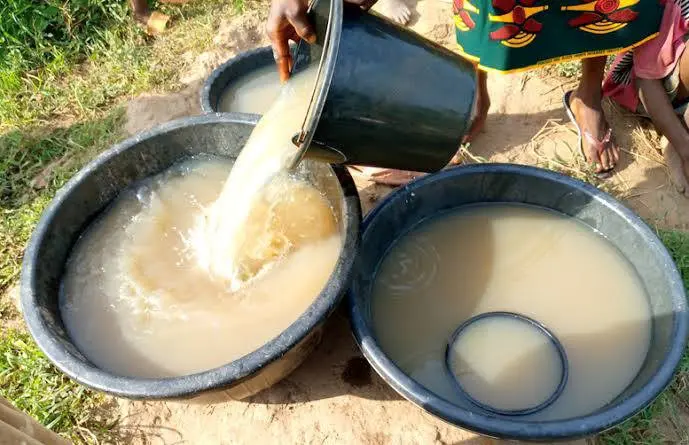By: Chioma Madonna Ndukwu
The water crisis in Otukpo, a town in Benue State, Nigeria, has worsened, with residents now forced to drink from dirty, muddy pools.
As the dry season intensifies, vital water sources such as wells and streams have dried up, exacerbating an already critical situation.
For years, Otukpo has struggled with access to clean water, but the crisis has become more severe, leaving survival dependent on “luck, improvisation, and sheer resilience,” as one resident described it.
The collapse of Otobi Water Works, a facility that once served as the town’s lifeline, is at the heart of the problem. The facility has been neglected for years, leaving residents with no reliable access to clean water.
As a result, people in both urban and rural areas now rely on contaminated water sources. The consequences have been devastating, with increasing cases of cholera, typhoid, and river blindness.
“We are left with no choice but to drink from muddy ponds, shallow wells, and contaminated streams,” shared a concerned resident.
Women and children, in particular, bear the brunt of the crisis, often walking long distances before dawn to collect water from neighboring areas like Ohimini LGA.
“Every morning, before the sun rises, we walk for miles to fetch water, sometimes competing with animals for access to stagnant pools,” said one local woman.
Several factors have contributed to the worsening crisis. Otukpo’s rocky terrain makes drilling boreholes almost impossible, unlike other areas where underground water sources are easier to tap.
“As Otukpo expands, the demand for water has far outstripped supply,” explained Agbo John, a resident of Obaganya. “Yet, no significant investments have been made to upgrade or expand the water infrastructure.”
Additionally, pollution has further contaminated available water sources, with many streams used for both washing and waste disposal.
In communities like Edikwu and Igbanonmaje, people fetch water from these polluted streams, increasing their exposure to dangerous bacteria and parasites.
One of the hardest-hit areas is Asa community, where residents now rely on the muddy remains of the Ukplo River.
In a desperate move, local residents have taken it upon themselves to drill into the river in hopes of finding alternative water sources. “We have no other choice; we have to find a way to survive,” said a community leader.
Philanthropist Mohammed Odeh Adah, known as Ochacho, has been supplying water through private initiatives, but the demand far exceeds the supply.
“Every time Ochacho’s water trucks come, there’s a rush and sometimes, not everyone gets enough,” said Emmanuel Obotu, a resident of Otukpo Township.
“We appreciate his effort, but this is a town of thousands, and one person’s kindness cannot solve an age-long crisis.”
The Benue State government has finally acknowledged the gravity of the situation. Hon. Ugwu Ameh Odoh, the state’s Commissioner for Water Resources, Environment, and Climate Change, has promised to restore the Otobi Water Works.
He stated, “The council has directed the Ministry of Water Resources, Environment, and Climate Change to invite CGC to commence the rehabilitation of the facility and restore water supply in Otobi, Otukpo, and their environs.”


